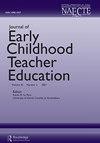Achievement goals as predictors of female pre-service elementary school teachers’ self-efficacy for learning math in a methods course
IF 1.3
Q3 EDUCATION & EDUCATIONAL RESEARCH
Journal of Early Childhood Teacher Education
Pub Date : 2021-08-02
DOI:10.1080/10901027.2021.1955052
引用次数: 0
Abstract
ABSTRACT Often pre-service early childhood and elementary teachers, many who are female, feel they are not good at math and appear uncomfortable at the prospect of teaching math. Given the influence pre-service teachers’ attitudes toward math might have on their learning, as well as that of their future students, examining the precursors of mathematical self-efficacy will prove helpful to instructors teaching math in elementary education coursework. Of relevance to the current study, some findings indicate achievement goals are linked to one’s self-efficacy for successfully completing mathematical tasks. However, published studies have not yet examined how the four achievement goals influence the self-efficacy for mathematical learning among pre-service elementary education students. Therefore, a unique purpose of this research is to focus on how achievement goals predict math self-efficacy among 163 female pre-service teachers enrolled in undergraduate elementary education math methods courses. Results reported here are part of a larger study examining pre-service teachers’ achievement goals for mathematical learning. Both mastery-approach and performance-approach goals were positive predictors of pre-service teachers’ self-efficacy for learning mathematics, while math anxiety predicted lower rates of self-efficacy.成就目标对女职前小学教师数学方法课程学习自我效能感的预测作用
学前幼儿教师和小学教师往往觉得自己不擅长数学,并且对教数学的前景感到不舒服,其中许多是女性。考虑到职前教师对数学的态度可能对他们的学习以及他们未来的学生产生的影响,研究数学自我效能感的前驱将证明对在基础教育课程中教授数学的教师有帮助。与当前研究相关的是,一些研究结果表明,成就目标与成功完成数学任务的自我效能有关。然而,已发表的研究尚未探讨这四种成就目标如何影响职前初等教育学生数学学习自我效能感。因此,本研究的独特目的是关注成就目标如何预测163名本科基础教育数学方法课程的女性职前教师的数学自我效能感。这里报告的结果是一项更大的研究的一部分,该研究考察了职前教师在数学学习方面的成就目标。掌握方法目标和绩效方法目标都是职前教师数学学习自我效能感的正向预测因子,而数学焦虑对职前教师数学学习自我效能感的预测率较低。
本文章由计算机程序翻译,如有差异,请以英文原文为准。
求助全文
约1分钟内获得全文
求助全文
来源期刊

Journal of Early Childhood Teacher Education
EDUCATION & EDUCATIONAL RESEARCH-
CiteScore
2.20
自引率
16.70%
发文量
27
期刊介绍:
The Journal of Early Childhood Teacher Education, the official journal of the National Association of Early Childhood Teacher Educators, publishes original manuscripts, reviews, and information about association activities. Its purpose is to provide a forum for consideration of issues and for exchange of information and ideas about research and practice in early childhood teacher education. JECTE welcomes research reports, position papers, essays on current issues, reflective reports on innovative teacher education practices, letters to the editor and book reviews.
 求助内容:
求助内容: 应助结果提醒方式:
应助结果提醒方式:


